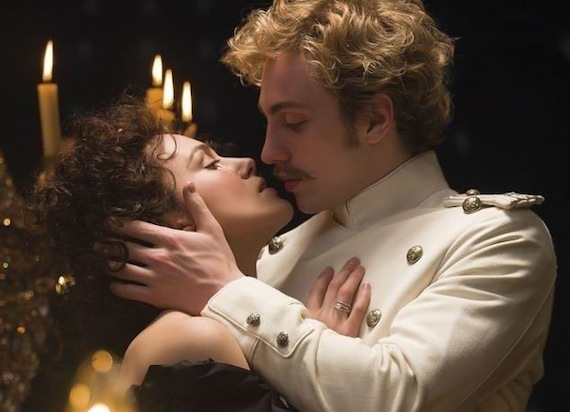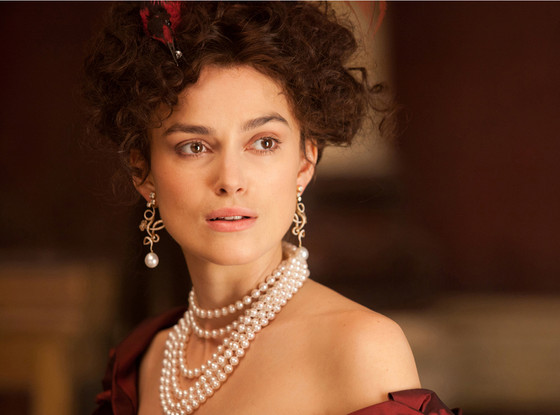 |
| Keira Knightley as Anna Karenina |
Written by Erin Fenner.
In Joe Wright’s adaptation of Leo Tolstoy’s Anna Karenina, we are relentlessly stuck in a nineteenth-century playhouse.
Instead of moving through space – sets move around the characters. Everyone is a tool of their society. They’re subject to frivolous, yet harmful social etiquette. And while props whiz past the characters, they are near static – sometimes their only movement is to literally fall backwards into another scene. Whatever personal will characters have is not rational, but instinctual and overwhelming. The characters base their life on propriety but their motivation shifts to a need to seek pleasure, and then a need to simply not suffer.
Anna Karenina is about how love is battered by rigid societal structures – how norms create an appearance of civility, but ultimately destroy individuals.
Anna Karenina (Keira Knightley) is a young married mother. Her husband, Alexi Karenin, (Jude Law) is a well-respected statesman and painfully kind. We meet Anna as she begins her journey to Moscow to see her brother, Oblonsky (Matthew Macfayden). There, her goal is to convince her brother’s wife, Dolly (Kelly Macdonald), to stay in her marriage. Oblonsky has been casually adulterous, and Dolly can’t bear to stay with him.
Oblonsky committed adultery and is only threatened with losing his wife. Dolly, on the other hand, now devastated by a man she devoted her life to, cannot do anything without losing everything. So, she forgives Oblonsky. And he returns to philandering because, as a man, he is exempt from the stringent rules that do apply to women. For men, societal rules are a game. For women, it’s serious. So, while the tragedy in Oblonksy’s family should be his own – his flaw being infidelity – the tragedy is his wife’s. Her flaw is that she is unfortunate enough to be a woman in a culture that denies women autonomy.
Anna convinces Dolly to stay with Oblonsky with a brutally layered argument. She sandwiches love around impending destitution. You love him right? If you leave him you will have nothing. But, don’t worry, because you love him.
This is how we meet Anna – as manipulative as the shifting set around her. She is persuading her sister-in-law with good intentions – but based on a system’s rules that ultimately marginalize.
It is almost immediately after meeting with Dolly that Anna pushes against propriety by dancing all night with the handsome young Count Vronsky (Aaron Taylor-Johnson) who is certainly not her husband. Wright, who also directed Pride and Prejudice¸ uses a device in Anna Kareninen that is reminiscent of a scene from Pride and Prejudice. Anna and Vronsky enter the dance floor and the rest of the dancers are frozen intermittently throughout a song – then the extra dancers disappear leaving us only with Anna and Vronsky. And Anna’s social rationality begins to slip.
 |
| Knightley and Aaron Taylor-Johnson in Anna Karenina |
It is after this that Vronsky begins taking extreme measures to seduce Anna. When she returns home from Moscow to St. Petersburg, Vronksy follows her and sets up in her town. He attends the parties she does and regularly indicates his interest in her even though she just as regularly declines him. Stalking has regularly been portrayed as a fundamental (and even romantic) aspect of courtship. Vronsky doesn’t win likability by his entitled, desperate and coercive approach to wooing an unwilling married woman. Of course Vronsky is able to stalk because it won’t damage his reputation, won’t strip him of livelihood or alienate him from his community. Anna has everything to lose. So, when they do consummate their affair, Anna calls Vronsky a “murderer” of her “happiness.”
[Spoilers ahead]
When Anna confesses her affair to her husband, Alexi’s main aim is to defer a scandal. Acting rational in this culture means following irrational rules.
But, when Anna gives birth to Vronsky’s daughter, it’s harder to keep the story mum. Anna almost dies in the process, and on her presumed deathbed she acts as a devoted wife and begs for forgiveness. She embraces demure, until she recovers. It makes sense that Anna could only bear living up (or down, rather) to feminine ideals when she was dying. Being a puppet to a patriarchal society while alive is excruciating for her.
When her affair becomes publicly known, Anna is ostracized by her community. Vronsky begs an old friend of hers to “call on her.” The friend refuses saying, “I’d call on her if she broke the law. But, she broke the rules.”
Because Anna was audacious enough to act on her own desire, she is to be punished. Oblonsky and Vronsky can sleep with whomever they want and receive little more than a reprimand and tongue-clicking. For her marital indiscretion, Anna loses her children, her friends and she is unable to even secure a divorce. Due to her intense isolation and social shunning, Anna breaks down and eventually throws herself onto the train tracks as a train comes barreling toward her.
We, like the characters, are mostly confined within the theater for the duration of the film. Occasionally the camera pans over a real setting – in the country or at a train station – but then we are subjected back to props and shifting sets. It devastatingly returns to the façade – while the agony of the drama is so more poignant. But we are reduced to pretense – and that’s where society wanted to keep Anna. The only way she could escape it was through death.

At some point Anna tells Vronsky “The law is made by fathers and husbands”.
That leaves unsaid that the law is made to curtail the freedom of daughters and wives to be actual human beings.
More like the tragedy of being a FUCKING BITCH